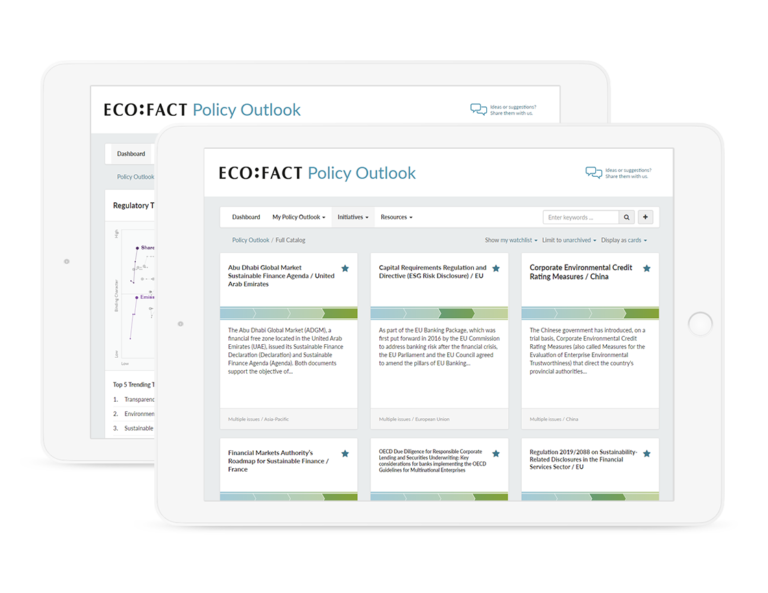EU Sustainability Taxonomy Regulation: What’s in it for the real economy?
The European Council adopted the European Union (EU) Regulation on the Establishment of a Framework to Facilitate Sustainable Investment (Sustainability Taxonomy Regulation). This is one of the final steps before the publication of the Sustainability Taxonomy Regulation in the Official Journal of the EU, which initiates the countdown to its entry into force.
The Sustainability Taxonomy is expected to be an instrument capable of reshaping the way business is conducted in Europe. It is seen as a key element in achieving the goals pursued by the EU Green Deal, in particular a fair and prosperous society—one with a modern, resource-efficient, and competitive economy where there are net-zero greenhouse gas (GHG) emissions by 2050 and where economic growth is decoupled from resource use.
When looking at the financial industry, the main economic sector impacted by the Sustainability Taxonomy Regulation, the level of awareness around the regulation’s introduction has been growing on a daily basis since February 2018, when Valdis Dombrovskis announced that a draft legislation for an EU sustainable finance taxonomy would be introduced that spring. However, the same cannot be said for other industry sectors, in particular those of the “real economy”, which will also be impacted by the Sustainability Taxonomy Regulation’s new normative requirements. The decision to include all industry sectors in the regulatory scope of the Sustainability Taxonomy Regulation was made during negotiations held between EU institutions. One of the main reasons for including obligations for the real economy was the need to ensure that financial institutions can have access to information necessary to issue sustainable investment products.
Once in force, the Sustainability Taxonomy Regulation will require all companies (including financial institutions) that are now expected to publish a non-financial statement under the EU Directive on Disclosure of Non-Financial and Diversity Information by Large Undertakings and Groups (Directive on Disclosure of Non-Financial Information) to complement their disclosures with the following information:
- The way and extent to which their activities are associated with environmentally sustainable economic activities (as set out in articles 3 and 5 of the Sustainability Taxonomy Regulation);
- The proportion of their turnover derived from products or services associated with environmentally sustainable economic activities (as set out in articles 3 and 5 of the Sustainability
Taxonomy Regulation); and - The proportion of their total investments (Capital Expenditure) and/or expenditures (Operational Expenditures) related to assets or processes associated with environmentally sustainable economic activities (set out in articles 3 and 5 of the Sustainability Taxonomy Regulation).
To support disclosure efforts, companies can rely on the Technical Screening Criteria to outline parameters for sustainable economic activities as well as a delegated act to be issued by the EU Commission by June 2021.
The regulation’s requirements will enter into force in a staged approach meaning that disclosures related to climate change adaptation and mitigation are expected to be included in non-financial statements from December 31, 2021, onwards, while disclosures related to other topics falling within the scope of the Sustainability Taxonomy Regulation will need to be included in non-financial statements issued after December 31, 2022.
The changes brought by the Sustainability Taxonomy Regulation have triggered the need for alterations to the Directive on Disclosure of Non-Financial Information. For instance, the EU Commission announced in December 2019 that it will undertake a revision of the Directive on Disclosure of Non-Financial Information by the end of 2020 with the aim of increasing companies’ disclosure on climate-related and environmental data. In preparation for this, the EU Commission is currently conducting an open consultation (until June 11, 2020) to gather views on possible revisions to the Directive on Disclosure of Non-Financial Information.
 All posts
All posts Contact
Contact



